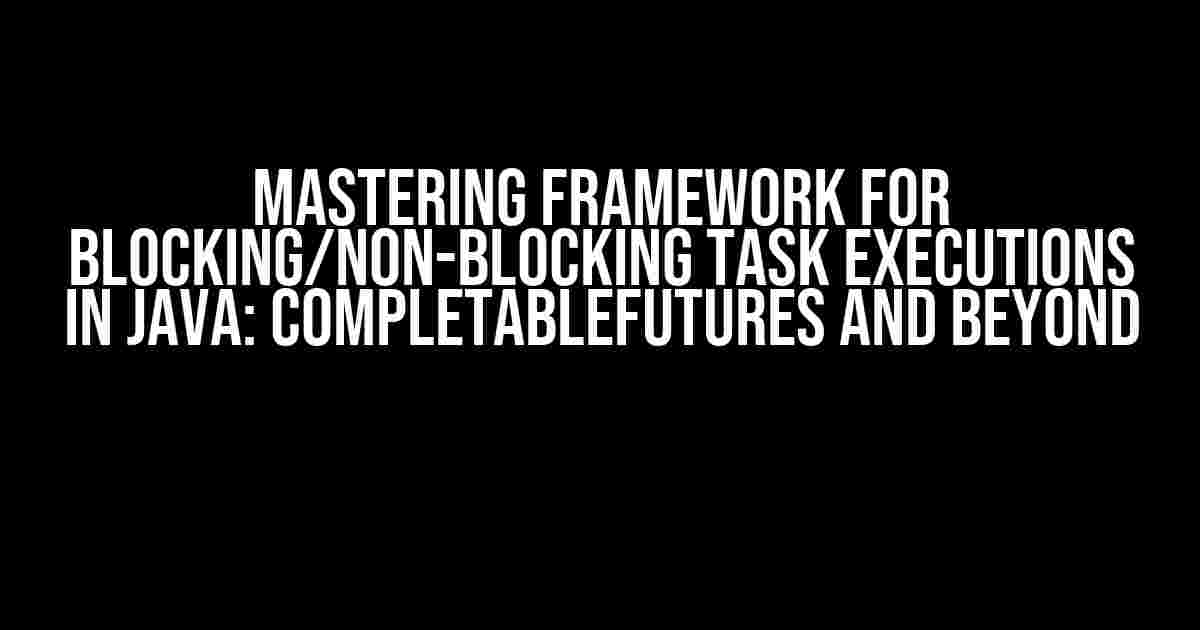Are you tired of dealing with tedious thread management and synchronization in your Java applications? Do you want to write more efficient, scalable, and concurrent code? Look no further! In this article, we’ll delve into the world of asynchronous programming in Java, exploring the framework for blocking and non-blocking task executions. We’ll focus on CompletableFutures, a powerful tool for managing asynchronous tasks, and discuss alternative approaches to help you become a master of concurrency.
Why Asynchronous Programming?
Before diving into the nuts and bolts of CompletableFutures, let’s understand why asynchronous programming is essential in today’s software development landscape. In a nutshell, asynchronous programming allows your application to:
- Improve responsiveness: By offloading computationally intensive tasks, you can ensure your application remains responsive and interactive.
- Boost performance: Asynchronous programming enables your application to perform multiple tasks concurrently, reducing overall processing time.
- Enhance scalability: By leveraging multiple CPU cores and threads, your application can handle increased workloads and scale more efficiently.
Blocking vs. Non-Blocking Tasks
Before we explore CompletableFutures, it’s essential to understand the difference between blocking and non-blocking tasks.
Blocking Tasks
A blocking task is a method or operation that suspends the execution of the calling thread until the task is complete. This approach can lead to:
- Resource waste: The calling thread remains blocked, unable to perform other tasks, resulting in inefficient resource utilization.
- Poor responsiveness: Blocking tasks can cause your application to become unresponsive, leading to a poor user experience.
Non-Blocking Tasks
A non-blocking task, on the other hand, allows the calling thread to continue executing other tasks while the asynchronous operation is in progress. This approach enables:
- Efficient resource utilization: The calling thread can perform other tasks, maximizing resource utilization.
- Improved responsiveness: Non-blocking tasks ensure your application remains responsive, even during prolonged operations.
CompletableFutures: The King of Asynchronous Programming
Java 8 introduced the CompletableFutures API, a powerful framework for managing asynchronous tasks. A CompletableFuture represents a computation that may not have completed yet, providing a way to handle asynchronous tasks with ease.
Creating a CompletableFuture
To create a CompletableFuture, you can use one of the following methods:
// Create a CompletableFuture using a supplier
CompletableFuture<String> future = CompletableFuture.supplyAsync(() -> {
// Perform some asynchronous operation
return "Result";
});
// Create a CompletableFuture using a Runnable
CompletableFuture<Void> future = CompletableFuture.runAsync(() -> {
// Perform some asynchronous operation
});
Handling CompletableFuture Results
Once a CompletableFuture is created, you can handle the result using various methods:
// Get the result using get()
String result = future.get();
// Use thenApply() to transform the result
CompletableFuture<String> transformedFuture = future.thenApply(result -> {
return "Transformed " + result;
});
// Use thenAccept() to consume the result
future.thenAccept(result -> {
System.out.println("Result: " + result);
});
Handling CompletableFuture Exceptions
When working with CompletableFutures, it’s essential to handle exceptions properly:
// Handle exceptions using exceptionally()
CompletableFuture<String> future = CompletableFuture.supplyAsync(() -> {
// Perform some operation that may throw an exception
return "Result";
}).exceptionally(throwable -> {
// Handle the exception
return "Error: " + throwable.getMessage();
});
Alternative Approaches to Asynchronous Programming
While CompletableFutures are an excellent choice for asynchronous programming, there are alternative approaches worth exploring:
Futures and Callable
Java’s Executor framework provides a way to execute asynchronous tasks using Futures and Callable:
ExecutorService executor = Executors.newSingleThreadExecutor();
Future<String> future = executor.submit(new Callable<String>() {
@Override
public String call() {
// Perform some asynchronous operation
return "Result";
}
});
RxJava
RxJava is a popular library for reactive programming, providing a powerful way to handle asynchronous tasks:
Observable<String> observable = Observable.just("Hello")
.map(String::toUpperCase)
.subscribeOn(Schedulers.io())
.observeOn(AndroidSchedulers.mainThread());
observable.subscribe(result -> {
System.out.println("Result: " + result);
}, throwable -> {
System.out.println("Error: " + throwable.getMessage());
});
Java 9’s Flow API
Java 9 introduced the Flow API, a reactive streams specification for asynchronous programming:
Publisher<String> publisher = Flow.Publisher.builder()
.bufferSize(10)
.build();
Subscriber<String> subscriber = new Subscriber<>() {
@Override
public void onSubscribe(Subscription s) {
s.request(Long.MAX_VALUE);
}
@Override
public void onNext(String item) {
System.out.println("Result: " + item);
}
@Override
public void onError(Throwable t) {
System.out.println("Error: " + t.getMessage());
}
@Override
public void onComplete() {
System.out.println("Completed!");
}
};
publisher.subscribe(subscriber);
| Framework | Description |
|---|---|
| CompletableFutures | A built-in Java API for managing asynchronous tasks |
| Futures and Callable | Java’s Executor framework for executing asynchronous tasks |
| RxJava | A popular library for reactive programming |
| Java 9’s Flow API | A reactive streams specification for asynchronous programming |
Conclusion
In this article, we’ve explored the world of asynchronous programming in Java, focusing on CompletableFutures as a powerful tool for managing blocking and non-blocking task executions. We’ve also discussed alternative approaches, including Futures and Callable, RxJava, and Java 9’s Flow API. By mastering these frameworks, you’ll be equipped to write more efficient, scalable, and concurrent code, taking your Java applications to the next level.
Remember, asynchronous programming is essential in today’s software development landscape. By adopting these practices, you’ll be able to:
- Improve responsiveness
- Boost performance
- Enhance scalability
So, what are you waiting for? Start exploring the world of asynchronous programming in Java today!
Frequently Asked Question
Get ready to unlock the secrets of blocking and non-blocking task executions in Java with CompletableFutures and more!
What is the main difference between blocking and non-blocking task executions in Java?
Blocking task executions in Java, also known as synchronous programming, occur when a thread waits for a task to complete before moving on to the next task. On the other hand, non-blocking task executions, or asynchronous programming, allow a thread to continue executing other tasks while waiting for a previous task to complete. This difference is crucial in terms of system responsiveness, resource utilization, and overall performance.
What is a CompletableFuture in Java, and how does it help with non-blocking task executions?
A CompletableFuture is a result object that is used to retrieve the result of an asynchronous computation. It provides a way to perform asynchronous programming in Java, allowing developers to write non-blocking code that is more efficient and scalable. With CompletableFutures, you can create a future that represents the result of a computation, and then use methods like thenApply(), thenCompose(), and get() to handle the result without blocking the execution thread.
Can I use other frameworks or libraries in Java for non-blocking task executions besides CompletableFutures?
Yes, there are several other frameworks and libraries in Java that provide features for non-blocking task executions. Some popular options include Project Reactor, RxJava, and Java 9’s Flow API. Each of these alternatives has its own strengths and weaknesses, but they all aim to provide a way to write asynchronous code that is efficient, scalable, and easy to maintain.
How do I handle errors and exceptions in non-blocking task executions with CompletableFutures?
When working with CompletableFutures, you can handle errors and exceptions using the exceptionally() method, which allows you to specify a fallback value or an alternative computation in case of an exception. Additionally, you can use the whenComplete() method to perform an action when the computation is complete, regardless of whether it was successful or not. This way, you can ensure that your code is robust and fault-tolerant, even in the face of unexpected errors.
What are some best practices for designing and implementing non-blocking task executions in Java?
Some best practices for designing and implementing non-blocking task executions in Java include using a consistent threading model, avoiding shared mutable state, and minimizing synchronization. You should also consider using a reactive programming model, which encourages the use of asynchronous APIs and event-driven programming. Furthermore, make sure to handle errors and exceptions properly, and consider using frameworks and libraries that provide support for backpressure and resource management.



